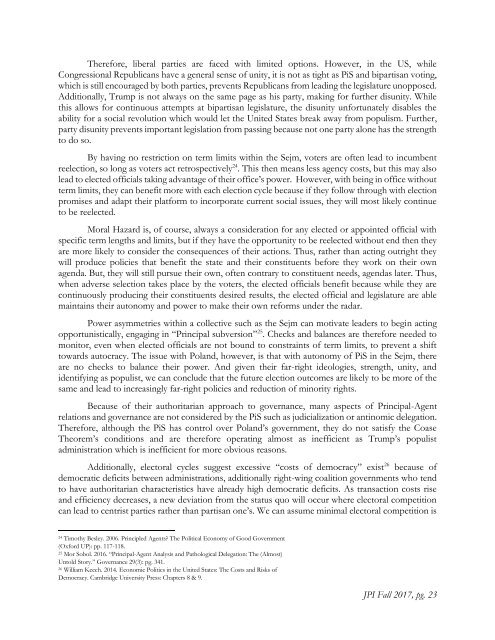JPI Spring 2018
Create successful ePaper yourself
Turn your PDF publications into a flip-book with our unique Google optimized e-Paper software.
Therefore, liberal parties are faced with limited options. However, in the US, while<br />
Congressional Republicans have a general sense of unity, it is not as tight as PiS and bipartisan voting,<br />
which is still encouraged by both parties, prevents Republicans from leading the legislature unopposed.<br />
Additionally, Trump is not always on the same page as his party, making for further disunity. While<br />
this allows for continuous attempts at bipartisan legislature, the disunity unfortunately disables the<br />
ability for a social revolution which would let the United States break away from populism. Further,<br />
party disunity prevents important legislation from passing because not one party alone has the strength<br />
to do so.<br />
By having no restriction on term limits within the Sejm, voters are often lead to incumbent<br />
reelection, so long as voters act retrospectively 24 . This then means less agency costs, but this may also<br />
lead to elected officials taking advantage of their office’s power. However, with being in office without<br />
term limits, they can benefit more with each election cycle because if they follow through with election<br />
promises and adapt their platform to incorporate current social issues, they will most likely continue<br />
to be reelected.<br />
Moral Hazard is, of course, always a consideration for any elected or appointed official with<br />
specific term lengths and limits, but if they have the opportunity to be reelected without end then they<br />
are more likely to consider the consequences of their actions. Thus, rather than acting outright they<br />
will produce policies that benefit the state and their constituents before they work on their own<br />
agenda. But, they will still pursue their own, often contrary to constituent needs, agendas later. Thus,<br />
when adverse selection takes place by the voters, the elected officials benefit because while they are<br />
continuously producing their constituents desired results, the elected official and legislature are able<br />
maintains their autonomy and power to make their own reforms under the radar.<br />
Power asymmetries within a collective such as the Sejm can motivate leaders to begin acting<br />
opportunistically, engaging in “Principal subversion” 25 . Checks and balances are therefore needed to<br />
monitor, even when elected officials are not bound to constraints of term limits, to prevent a shift<br />
towards autocracy. The issue with Poland, however, is that with autonomy of PiS in the Sejm, there<br />
are no checks to balance their power. And given their far-right ideologies, strength, unity, and<br />
identifying as populist, we can conclude that the future election outcomes are likely to be more of the<br />
same and lead to increasingly far-right policies and reduction of minority rights.<br />
Because of their authoritarian approach to governance, many aspects of Principal-Agent<br />
relations and governance are not considered by the PiS such as judicialization or antinomic delegation.<br />
Therefore, although the PiS has control over Poland’s government, they do not satisfy the Coase<br />
Theorem’s conditions and are therefore operating almost as inefficient as Trump’s populist<br />
administration which is inefficient for more obvious reasons.<br />
Additionally, electoral cycles suggest excessive “costs of democracy” exist 26 because of<br />
democratic deficits between administrations, additionally right-wing coalition governments who tend<br />
to have authoritarian characteristics have already high democratic deficits. As transaction costs rise<br />
and efficiency decreases, a new deviation from the status quo will occur where electoral competition<br />
can lead to centrist parties rather than partisan one’s. We can assume minimal electoral competition is<br />
24<br />
Timothy Besley. 2006. Principled Agents? The Political Economy of Good Government<br />
(Oxford UP): pp. 117-118.<br />
25<br />
Mor Sobol. 2016. “Principal-Agent Analysis and Pathological Delegation: The (Almost)<br />
Untold Story.” Governance 29(3): pg. 341.<br />
26<br />
William Keech. 2014. Economic Politics in the United States: The Costs and Risks of<br />
Democracy. Cambridge University Press: Chapters 8 & 9.<br />
<strong>JPI</strong> Fall 2017, pg. 23
















